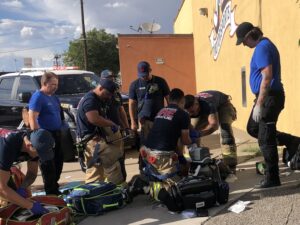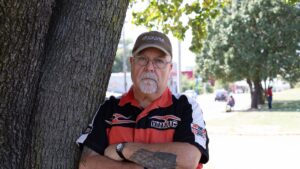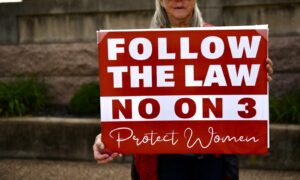11:00
News Story
Bill designed to lower suicide rate of Missouri veterans awaits action by governor
State lawmakers approved the study of suicide prevention for MO’s veterans, but not the study of ‘magic mushrooms’ to treat veterans’ depression.
State lawmakers tasked the Missouri Veterans Commission with a new mission.
They’ve mandated the commission to make it a top priority to understand why the suicide rate among Missouri’s veterans is nearly double the state rate and one of the highest in the country.
After three years of trying, Republican state Rep. Dave Griffith of Jefferson City said he was grateful to finally get the bill passed earlier this month, receiving unanimous approval from both the House and Senate.
It awaits the governor’s signature.
“We’ve accomplished a first step,” Griffith told The Independent, “and that is to try and get to the core of why veterans are committing suicide at such an alarming rate, especially in Missouri.”
The bill mandates the commission take a deep dive into procedures, treatment options and any other necessary assistance to reduce the veteran suicide rate.
In separate budget bills, lawmakers approved $120,000 for the commission to hire one or more people dedicated to the mission.
Retired Col. Paul Kirchhoff, the commission’s executive director, told the House Veterans Commission in January that he embraces the new task, particularly because he’s lost several close military friends to suicide.
“This is near and dear to my heart,” Kirchhoff said. “We’re losing veterans every day to this. And whatever we can do to curb that, we’re all in.”
The Missouri Veterans Commission has long had three core missions of managing the veterans’ homes, cemeteries and service officers who help veterans with their benefits, Kirchhoff said.
The bill would add a fourth.
Many people can guess, he said, the reason Missouri has a higher rate than the national average.
“But I’d like to know through facts,” he said. “And without having an emphasis on this, we just won’t know.”
According to the legislation, the commission must file a report every year on July 1 with the Department of Public Safety and the General Assembly on the recommendations and implementation of its efforts.
In 2021, Gov. Mike Parson established an interagency team to collaborate on suicide prevention, so Griffith expects to receive the governor’s full support on the measure, he said.
‘Magic mushroom’ stalled out

But Griffith didn’t see all of his legislative wish list make it over the finish line this session.
He strongly supported a bill to conduct a clinical study on using psilocybin, more commonly referred to as “magic mushrooms,” to treat PTSD and depression among veterans.
Last year, the House overwhelmingly approved the measure. But it never made it to a final House vote during the session that ended earlier this month.
“Many of our veterans experience high amounts of PTSD due to serving their country – due to protecting us,” Republican state Sen. Holly Thompson Rehder, who carried the Senate bill, said in January. “There should be no limits for them when it comes to access to mental health treatment, including non-pharmacological treatments.”
The legislation would have required the Missouri Department of Health and Senior Services to provide grants totaling $2 million for the research, subject to lawmakers approving the appropriation.
The state would collaborate on the study with a Missouri university hospital or medical center operated by the U.S. Department of Veterans Affairs in Missouri. The focus of the treatment is on patients suffering from post-traumatic stress disorder, depression, substance use disorders or for those who require end-of-life care.
Psychiatry researchers at Washington University School of Medicine in St. Louis were the first in Missouri to give a legal dose of psilocybin in 2019.
They have been using a brain-imaging technique to learn how psilocybin affects certain networks in the brain. Psilocybin helps people break harmful habits and ways of thinking, which applies to PTSD and psychosis as well, said researcher Joshua Siegel, an instructor of psychiatry at Washington University.
All antidepressants make the brain’s emotion circuits more “plastic and adaptable,” he said, which makes them more open to change.
“Psilocybin just happens to do that very rapidly,” he said in January.
Combined with preparation and help from therapists processing the experience afterwards, he said psilocybin successfully helps people choose new patterns of behavior and thinking.
“At this point, there’s a critical mass of studies of clinical trials that have shown positive responses,” Siegel said. “So I think that’s hard to deny.”
Griffith said the House Veterans Committee, which he chairs, has been closely following the research on how psilocybin can be “a useful tool” to deal with veterans’ PTSD and depression. But he’s not sure the rest of his colleagues in the General Assembly “get the full picture.”
“I think when they hear ‘magic mushrooms,’ they think back to the 60s and 70s to what the hippies were taking to go on a trip,” he said. “They don’t fully realize how a lot of these medicines, under controlled circumstances, can be used to treat some serious mental health issues.”
Our stories may be republished online or in print under Creative Commons license CC BY-NC-ND 4.0. We ask that you edit only for style or to shorten, provide proper attribution and link to our website. AP and Getty images may not be republished. Please see our republishing guidelines for use of any other photos and graphics.





